
Kagbapu's Literary Legacy
Where wisdom and spirit converge
Kagvani
The Kagvani series is Kagbapu’s most celebrated work, an eight-part collection often described as "the voice that emerges from within." This series weaves together poetry and prose to explore the depths of life, spirituality, and social values, offering timeless wisdom that resonates across generations. Revered as a distilled essence of the Ramayana and Gita, it elegantly encapsulates the sacred principles and virtues of these epics, enriching its universal appeal. It stands as a testament to Kagbapu’s profound connection to humanity, his devotion to the divine, and his commitment to service, making it a cornerstone of his literary legacy.
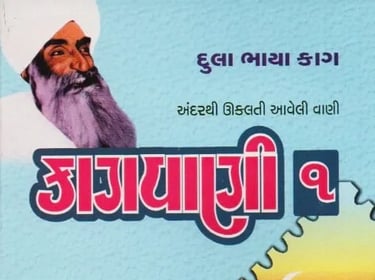

Kagvani Part 1 (Krishna Prerit Kagvani)
Inspired by the divine figure of Lord Krishna, this inaugural volume unveils a treasury of spiritual insights and deeper meanings. Through poetic expressions, Kagbapu explores devotion, righteousness, and the soul’s eternal bond with the divine, drawing from the Bhagavad Gita’s timeless teachings. The title "Krishna Prerit Kagvani" reflects dual reverence: it honors Lord Krishna’s celestial wisdom and pays homage to Maharaja Krishnakumarsinhji Gohil of Bhavnagar, a visionary leader with whom Kagbapu shared a profound bond, whose noble surrender of his kingdom first united India post-independence. It invites reflection on purpose and higher truth.
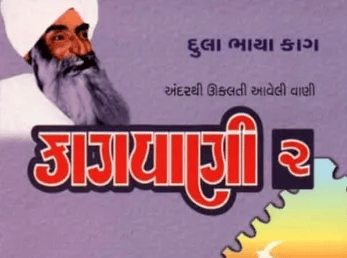

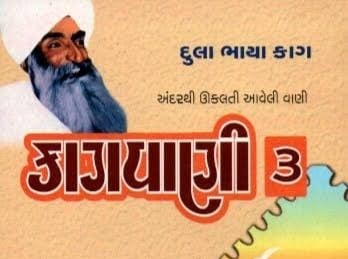

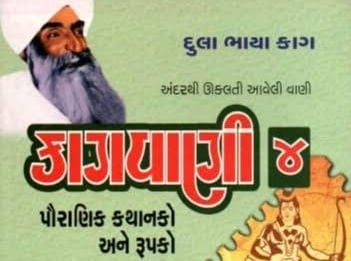

Kagvani Part 2
Building on the foundation of the first volume, this part continues Kagbapu’s spiritual and philosophical journey. It delves into the complexities of the human condition, the importance of morality, and the relentless search for truth. With vivid imagery and thoughtful verses, it offers readers a guide to living a meaningful and principled life, grounded in compassion and introspection.
Kagvani Part 3 (Duhaa)
This volume is a rich collection of duhas (couplets), a traditional poetic form that Kagbapu masterfully employs to distill his teachings into concise yet profound wisdom. Each duha addresses life’s challenges—be it personal struggles, ethical dilemmas, or the quest for inner peace—serving as a portable source of inspiration and guidance for readers seeking clarity in a chaotic world.
Kagvani Part 4
Here, Kagbapu ventures deeper into the spiritual realm, exploring the soul’s journey through life and beyond. This part contemplates the nature of existence, the pursuit of enlightenment, and the transformative power of devotion and self-realization, while adorning its verses with exquisite excerpts from the Ramayana and Mahabharata. Through poetic renditions of specific events from these epics, Kagbapu crafts hymns that illuminate the ethical grandeur and virtuous ideals, justifying each narrative with a tapestry of moral principles and timeless values, inviting readers to ponder their own spiritual path and the mysteries that lie at the heart of being.
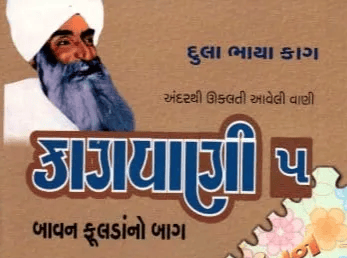

Kagvani Part 5 (Bavan Fuldano Baag)
Distinct within the series, this volume departs from poetry to present a collection of quotes. These succinct yet powerful statements offer practical lessons on diverse aspects of life—personal growth, relationships, and societal harmony. Reflecting Kagbapu’s pragmatic approach to spirituality, it provides readers with actionable insights to navigate everyday challenges with grace and wisdom.
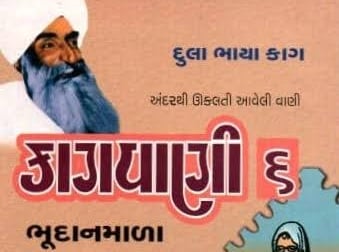

Kagvani Part 6 (Bhoodan Mala)
Dedicated to the Bhoodan movement and its visionary leader, Vinoba Bhave, this book embodies Kagbapu’s passion for social reform. It celebrates the ideals of selfless service and equitable land distribution for the welfare of the poor, a cause Kagbapu championed by donating 650 bighas of his own land. Through its verses, it underscores the intersection of spirituality and social justice, urging readers to contribute to a more equitable world.
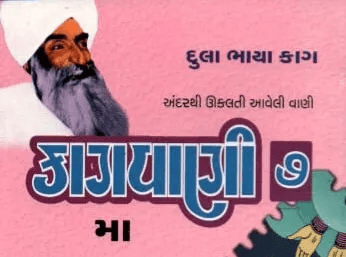

Kagvani Part 7 (Maa)
A deeply emotional tribute to motherhood, this volume honors both Kagbapu’s own mother and the universal archetype of the divine feminine. It explores the boundless love, sacrifice, and resilience of mothers, portraying them as the nurturing force behind life and society. With tender and evocative language, Kagbapu elevates the maternal spirit to a sacred pedestal, resonating with readers of all backgrounds.
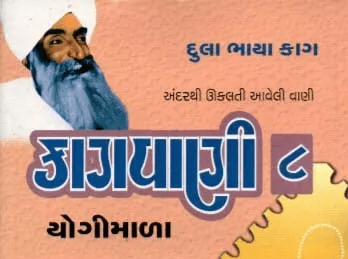

Kagvani Part 8 (Yogi Mala)
Inspired by Yogiji Maharaj of the Swaminarayan sect, this final volume serves as a spiritual guide for those seeking inner transformation. It delves into the practices of devotion, discipline, and surrender, offering a roadmap to deepen one’s spiritual journey. Kagbapu’s reverence for Yogiji’s teachings shines through, making this a fitting culmination of the Kagvani series’ exploration of faith and enlightenment.
Other Works by Kagbapu
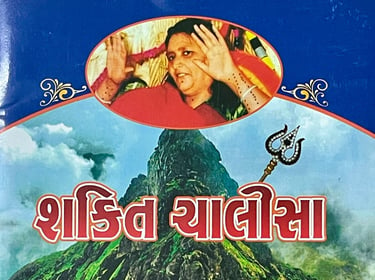

Shakti Chalisa
This devotional masterpiece is a heartfelt tribute to Aai Shri Sonal Mataji of Madhada, a revered figure celebrated as a goddess for her lifelong dedication to public welfare, national service, and spiritual devotion. Written in the form of duhas, Kagbapu captures her extraordinary life and the indelible mark she left on society. The book portrays Sonal Mataji as an embodiment of divine feminine power (Shakti), whose legacy of compassion and service continues to inspire generations, making it a powerful ode to her enduring influence.
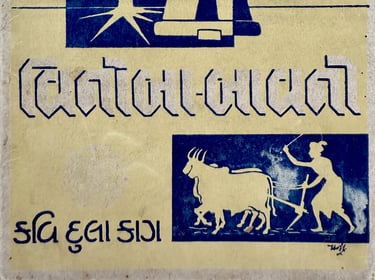

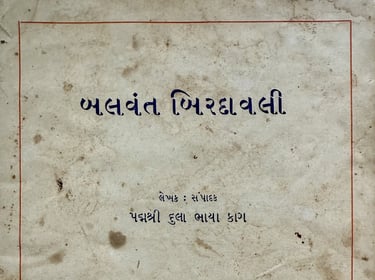

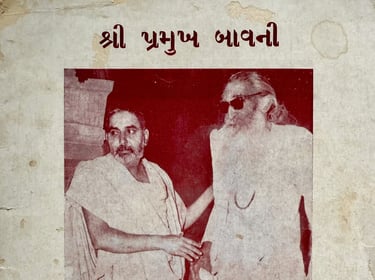

Vinoba Bavni
Comprising 52 duhas, this book is a moving tribute to Vinoba Bhave, composed after his death to honor his monumental contributions to India, particularly through the Bhoodan movement. Kagbapu, profoundly influenced by Bhave’s vision of land redistribution for the landless, donated 650 bighas of his own land to this cause. This Bavni reflects Kagbapu’s deep admiration for Bhave’s selfless service and his belief in nonviolent social change, weaving together themes of sacrifice, justice, and spiritual integrity in a poetic homage.
Balwant Birdavali
Published in 1965, this work is a poetic tribute to the esteemed Shri Balwantray Mehta, written after his passing. Through its verses, Kagbapu commemorates Mehta’s life, his significant contributions to society, and his legacy as a leader and visionary. The book serves as both a memorial and a celebration, highlighting Mehta’s impact on his community and the enduring values he stood for, rendered in Kagbapu’s signature style of poignant and reflective poetry.
Pramukh Bavni
Published in 1973 to celebrate P.P. Pramukhswami Maharaj’s 53rd birth anniversary, this book honors his spiritual leadership through 52 duhas. Unlike other Bavni titles, this is not a post-death tribute but a living homage to Pramukhswami’s life and teachings. Kagbapu extols his role as a beacon for countless followers within the Swaminarayan sect, capturing his wisdom, humility, and devotion in verses that inspire spiritual growth and reverence.
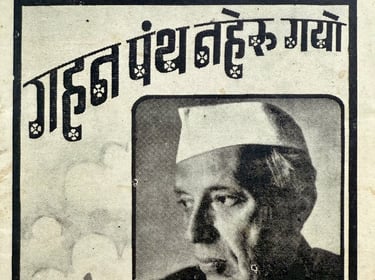

Gahan Panth Nehru Gayo
Published in 1964, this work is a tribute to Jawaharlal Nehru, written after his death to reflect on his towering role in shaping modern India. Kagbapu’s verses explore Nehru’s vision for the nation, his leadership during its formative years, and his contributions to its progress and identity. With a blend of reverence and introspection, the book honors Nehru’s legacy as a statesman who guided India through turbulent times, offering readers a poetic lens into his enduring impact.
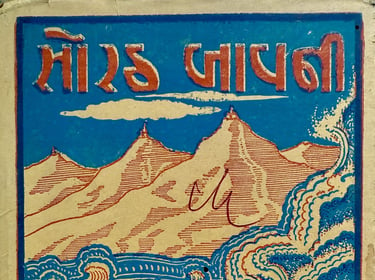

Sorath Bavni
A historical gem published in 1948, this book encapsulates the spirit of India’s independence era through 52 duhas. Written as a tribute to the nation’s journey to freedom rather than an individual, it vividly portrays the struggles, sacrifices, and triumphs of the independence movement. Kagbapu’s verses evoke the emotions and aspirations of the time, making it a timeless reflection on India’s resilience and the collective joy of liberation.
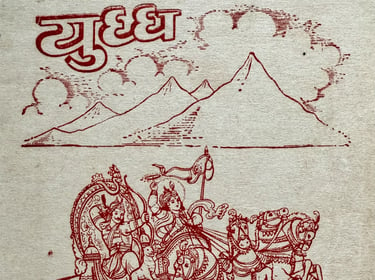

Yuddh
Composed during the 1962 India-China war, this book offers a poignant meditation on conflict and its consequences. Through reflective verses, Kagbapu examines the themes of war, peace, and national unity, urging readers to consider the human cost of strife and the strength required to endure adversity. Written in a time of national crisis, it stands as both a historical document and a call for resilience and reconciliation.
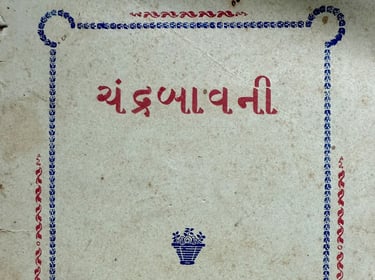

Chandra Bavni
Published in 1951, this book is a tribute to Namdar Thakore Sahebshri Chandrasinhji, written after his death. Comprising 52 duhas, it celebrates his life, achievements, and contributions to society, portraying him as a noble leader whose legacy endures. Kagbapu’s verses weave together admiration and nostalgia, offering a poetic eulogy that honors Chandrasinhji’s character and his service to his people.
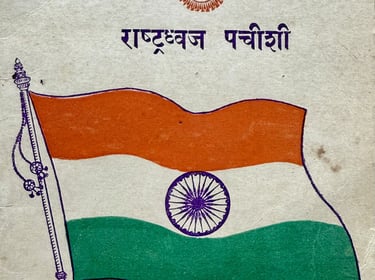

Rashtradhwaj Pachisi
Kagbapu’s first Hindi book, composed on August 15, 1947, to celebrate India’s independence, this work is a patriotic tribute to the nation’s freedom. Its verses capture the exhilaration of raising the national flag, symbolizing hope, unity, and the dawn of a new era. With vivid imagery and heartfelt emotion, it reflects the pride and joy of a newly liberated India, marking a significant milestone in Kagbapu’s literary journey.
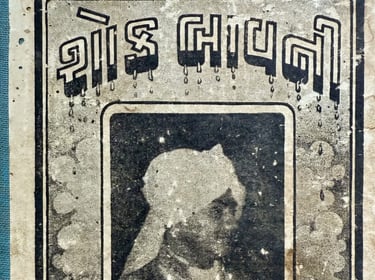

Shok Bavni
Published in 1965, this book is a tribute to Bhavnagar’s beloved Maharaja Shri Krishnakumarsinhji, written after his death. Through 52 duhas, Kagbapu expresses both grief and reverence, honoring the Maharaja’s life, his contributions to the region, and his legacy as a compassionate ruler. The verses blend mourning with celebration, painting a vivid picture of a leader whose benevolence touched countless lives.
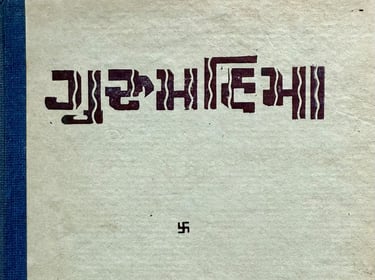

Guru Mahima
Released in 1971, this book glorifies the greatness of spiritual gurus through devotional duhas. Kagbapu explores the guru’s role as a guide, mentor, and source of divine wisdom, emphasizing the importance of surrender and devotion in the spiritual journey. With its lyrical reverence, the book inspires readers to seek enlightenment through the guidance of a guru, reflecting Kagbapu’s deep respect for this sacred relationship.
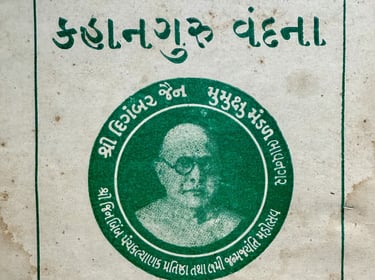

Kahan Guru Vandana
Published in 1969, this work is dedicated to P.P. Kanjiswami, honoring his spiritual teachings through a series of duhas. It serves as a tribute to his life and wisdom, offering readers a glimpse into his profound influence on Kag Bapu and his followers. The verses blend devotion and gratitude, celebrating Kanjiswami’s legacy as a spiritual luminary who illuminated the path to inner peace.
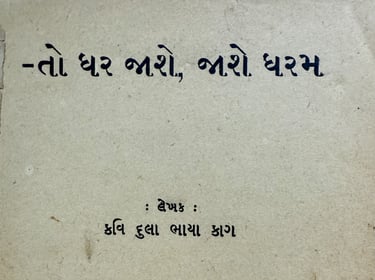

Toh Ghar Jasho, Jasho Dharam
Published in 1959 by the Prohibition Committee of Rajkot, this book was a powerful tool in Gujarat’s anti-alcohol movement. Through compelling verses, Kagbapu advocates for sobriety, moral integrity, and the preservation of one’s duties (dharma) amidst societal challenges. Distributed at a nominal price to maximize its reach, it reflects his commitment to social reform and his ability to use poetry as a vehicle for change.
We’re working to make the full books available online for you . Check back later for them!
© Kavi Shri Dula Kag Memorial Trust 2025. All rights reserved.
info@kagsahitya.org
+91 8488 906906
|
Quick Links:
|
|
|
|
Contact Us:
Connect with us:
|
